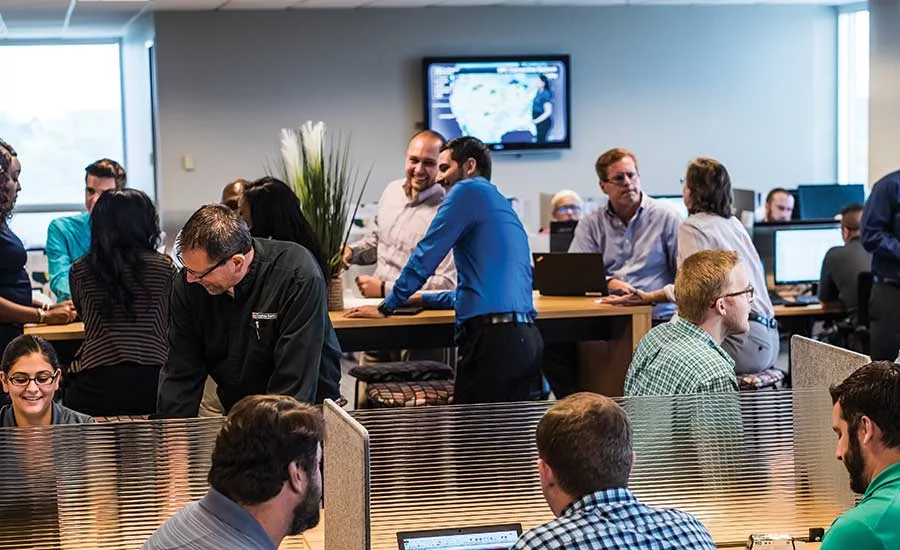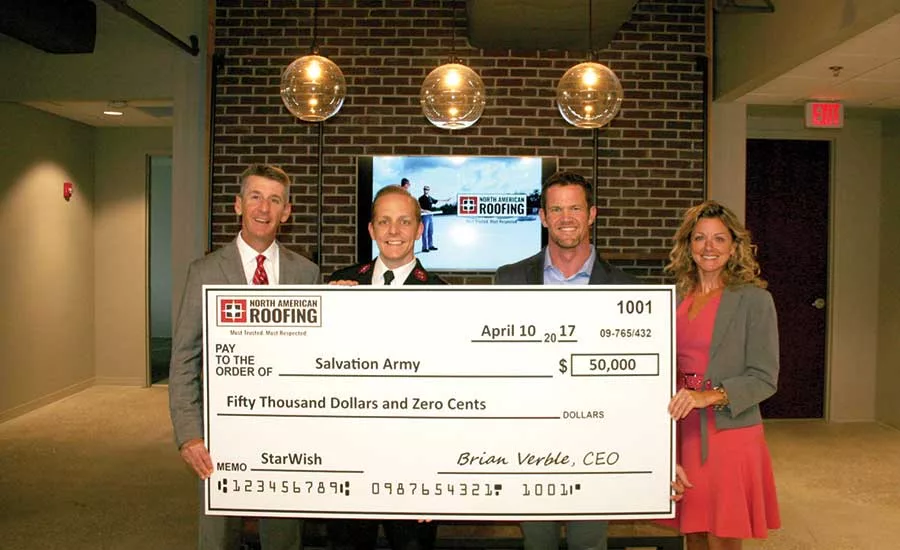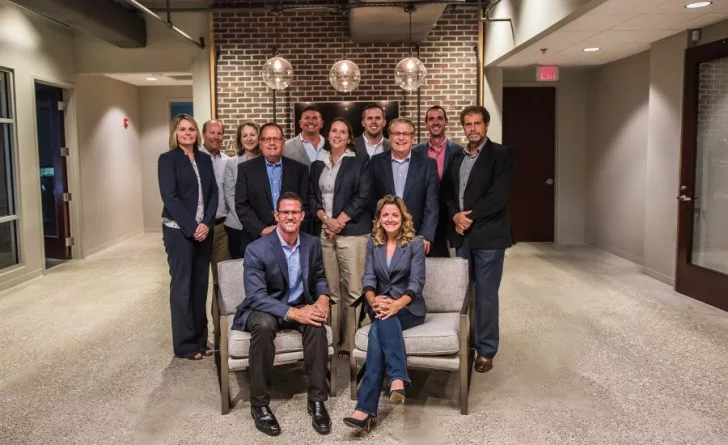On the Move: North American Roofing Services, Inc.
North American Roofing Services, Inc. has a New Home, but Remains Just as Committed to Roofing Anywhere and Everywhere

COO Kelly Wade and President Brian Verble work on a 10-year business plan designed to increase the company’s national footprint.

Employees at the new Tampa, Fla. headquarters work in an open floor plan and environment designed to encourage collaboration. Photos courtesy of North American Roofing Services, Inc.

North American Roofing Services, Inc. presented a $50,000 contribution to the Salvation Army earlier this year on behalf of the StarWish Foundation, the company’s philanthropic arm that gives back to community projects.

Relocating a roofing company with a national reach and hundreds of employees to a new state presents a wealth of logistical challenges that could have an impact on individual and overall team performance. The key to executing it for North American Roofing Services, Inc. earlier this year was making sure any impact, if to be felt at all, would be positive.
“We started in Indianapolis (1979), we relocated to Asheville (North Carolina in 1993) and now this is the third move — to Tampa,” said COO Kelly Wade. “We did it to find and attract great people, and to grow the way we wanted to.”
To help that happen, Wade made two crystal-clear demands for the designer of their new 25,000 square-foot office space:
1) Not to use anything — from flooring and furnishings to light fixtures and employee amenities — that one would normally see in a traditional office space; and 2) Make sure every seat, table, and countertop across the floorplan had an electrical outlet for laptops and mobile devices.
In addition to making the electricians work double-time, Wade had the top floor of the six-story building — previously occupied by an engineering firm — gutted completely. Replacing rows of cubicles are a wellness room, where new mothers can take breaks to pump breastmilk; huddle rooms for individual and small-team work sessions; and soundproof phone booths available for personal or business calls. The covered ceiling was removed to expose the framework and mechanical systems, and polished cement flooring was added to the lobby area to provide a ‘construction-company feel’ when people walk in.
And that’s just about where the physical similarities between this office space and most other roofing contractors stops.
Aside for a few offices assigned to top executives, and a café outfitted with the latest appliances — including an espresso machine — all work and business decisions are made in an open space with comfortable chairs and snake sofas. It’s designed to be a collaborative environment where seasoned company leaders feel just as comfortable discussing business details as do new staffers focused on customer service.
“I felt very strongly (the office design) should be an extension of how we go to market,” Wade explained. “If we want to be collaborative, centrally managed and provide a uniform experience then we all need to be out and working together.”
Substance and Style
Though it was a change for some people, the bold move is emblematic of Wade’s unconventional and straightforward management style that’s helped propel the company to the top-tier of commercial roofing contractors in the country. North American Roofing Services, Inc. reported $150 million in revenue in 2016, good for 6th place on Roofing Contractor’s Top 100 list for 2017 (see page 38).
It’s a 25 percent increase since 2015, fueled in part by strong relationships with multi-national chains that have multiple facilities — like the Home Depot, the company’s first national client. The sustained success is also partly due to well-oiled sales and procurement operations that allow crews to deploy quickly and maintain high workloads across the country. Last year alone, crews completed 425 projects on commercial properties and industrial sites, and installed roughly 30 million square-feet of single-ply roofing around the country.
And they stayed safe along the way, outperforming the average industry Experience Modification Rate (EMR) rating of 1 by closing 2016 at .73, officials said. Other impressive statistics from 2016 include: a total recordable incident rate of 0.982; a total lost workday rate of 0.246, and a days away restricted or transferred rate of 0.491.
That reflects a long-term commitment to employee safety dating back to company founder Carl Verble, a successful homebuilder and commercial property developer in Indianapolis that branched out into roofing in 1979. Carl’s son, Mike, continued the tradition while growing the company’s national footprint before relocating to Asheville, N.C. Though the company’s niche was in commercial projects, Mike established a separate company, Installed Products USA, to provide residential roofing services for The Home Depot.
He put his son, Brian — who practically grew up in company headquarters and had been with the roofing company professionally after attending Duke University in the late 1980s — in charge and moved it to Tampa. Within five years, the company opened in 28 markets around the country and grew into a $175 million operation. The home-improvement retail giant bought the company, and Brian rejoined the family roofing business.
He said the experience was invaluable from a leadership standpoint, but unexpectedly changed how he looked at business — for the better.
“That was quite an adventure and education,” he recalled. “You learn a lot more by doing than any kind of formal education.”
Specifically, Verble said he started to see what roles standardization, process and continuity from one location to another played in building and maintaining a large, successful operation. He looked internally at North American’s structure and saw the need to infuse that perspective into roofing.
A ‘Quiet Giant’s’ Evolution
Promoted to president in 2007, Brian started to implement some of his ideas for growing the business and made technology a high priority in order to measure performance and ensure consistency company-wide.
“I came in and began to really understand how the company was run, how information flowed,” he said. “We needed to make sure that we had the same experience in one of our branches as we did in another branch, so we did a lot of training.
“My belief was that we needed to be more transparent between departments and with the customer from the beginning to the end,” he continued. “It took a lot of technology to do that as far as how we store documents and communicate to create a workflow process.”
In addition to upgrading the company’s technological capabilities, Verble also put a premium on leadership positions, and looked outside the roofing industry to fill them.
Among them was Wade, whom he met in 2009 while scouting Asheville-based ad agencies for a branding campaign. When she learned Verble had no one picked internally to spearhead the campaign, she took her shot, and he hired her as marketing director. Always more involved in strategy than on the creative side during her marketing career, Wade proved to be a valuable asset and became vice president of strategic planning within two years, and then executive vice president 18 months later.
“We are a diverse bunch … and always try to hire people with great character from outside of our industry,” Verble explained. “This diversity is one of our greatest strengths. I love how our varied backgrounds give us fresh perspectives in an industry that sometimes gets ‘set in its ways.’”
Now COO, Wade said she’s firmly settled in her roles as corporate cheerleader externally, and driver of the company’s internal, bottom-up culture that values ideas, solutions and discussion. Both functions are anchored by small business principles engrained in her personality at a young age from watching her entrepreneurial father, who had several small retail businesses.
“I was completely engrossed by and loved business,” she said. “I grew up knowing and understanding that small business mentality where the customer was always right, and the hours of work were never done until the customer was completely satisfied.”
She said the company was founded on those principles and it’s her responsibility to maintain them regardless of how large North American gets.
“They had done a wonderful job for 30-plus years building this company into a ‘quiet giant’ and a very profitable, family-run company,” she said. “Under Brian’s leadership, the company became more process-oriented and transformed to focus on spreading its wings for exponential growth. But we never want to make it feel ‘too big.’”
Forward Focused
Perhaps the company’s biggest transition came in 2012, as Verble and Wade shepherded in an Employee Stock Ownership Program (ESOP). It allowed Verble’s father to exit the business and also solidified the stake of every employee in the company’s future success.
Though change in most large organizations can be challenging, the ESOP’s positive impact was virtually immediate.
“It was an overnight empowerment of our employees,” Wade described. “People were turning the lights off, they began questioning things like ‘bagel Fridays,’ or why we needed the soda machine … it was an incredible transformation.”
The added layer of accountability has motivated employees, keeps their compensation in line because it’s part of their overall benefits package and as an investment tool becomes a huge perk most others in the industry don’t offer. Employees now also get flexible schedules; four days off a month for any type of volunteer work; educational allowances for advanced degrees; 401K match; and competitive medical/dental packages.
Despite their sizeable growth since the transition, Wade said North American has finished under budget every year since implementing the ESOP.
The company operates on a 10-year business plan that’s open to annual adjustments based on market factors. Even though North American sits among the top revenue producers industry-wide, both Wade and Verble said they’re expecting double-digit growth annually over the next decade and see plenty of opportunity to improve market share by doing higher-volume work across the country.
A sizeable backlog of work from last year, and record sales in the first quarter have 2017, in particular, looking very promising, Verble said.
“Moving forward, we really have a great working system and platform to continue to build upon our national footprint and penetrate additional markets where we historically haven’t done as much business,” he explained. “We’re going to continue to expand and diversify with good strategic growth for the next foreseeable future so that the employees here will continue to do very well.”
Looking for a reprint of this article?
From high-res PDFs to custom plaques, order your copy today!







